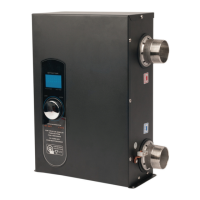3
Water Chemistry
Water Temperature 68-104°F (20-40°C)
pH 7.6-7.8
Total Alkalinity (ppm) 80-120
Calcium Hardness (ppm) 200-400
Salt (ppm) 4500 Maximum
Free Chlorine (ppm)* 2-3
Total Dissolved Solids (ppm) 3000 Maximum**
*Free Chlorine MUST NOT EXCEED 5 ppm!
**In saltwater chlorinated pools, the total TDS can be as high
as 6000 ppm.
Table A. Spa and Pool Water Chemistry
2. WATER CHEMISTRY
CAUTION:
For your health and the protection of your pool equipment,
it is essential that your water be chemically balanced.
The levels shown in Table A must be used as a guide for
balanced water.
Pool/Spa Water Chemistry
Occasional chemical shock dosing of the pool or spa
should not damage the heat exchanger providing the
water is balanced. Automatic chemical dosing devices
water. If not controlled, they can lead to high chemical
levels which can damage the heat exchanger. Further
advice should be obtained from your pool or spa builder,
accredited pool shop, or chemical supplier for the correct
levels for your water.
Automatic Chlorinators and Chemical
Feeders
All chemicals must be introduced downstream of the
heater and completely diluted into the water before being
circulated through the heater. Chlorinators must feed
downstream of the heat exchanger and have an anti-
siphoning device or check valve to prevent chemical back-
CAUTION:
that are out of adjustment will cause rapid corrosion of
the warranty.
CAUTI
under the warranty.
3. SAFETY INFORMATION
Pool water temperatures typically range from 78°F (26°C)
to 82°F (28°C). The American Red Cross recommends a
temperature of 78°F (26°C) for competitive swimming.
However, this may be too cool for young children and the
elderly, who may require a te mperature of 80°F (27°C) or
higher.
4. OVERVIEW
Congratulations on the purchase of the most advanced
spa/pool electrical heater in the market. To get the best
performance and savings from your new heater, it is
important to install the heater in accordance with our
instructions and the electrical, plumbing codes applicable
to your area. If you have any questions, please contact your
Authorized Dealer, or visit our website at www.raypak.com.
READ AND FOLLOW ALL INSTRUCTIONS
GIVEN IN THIS MANUAL.
is considered unsafe for all persons. Lower water
temperatures are recommended for extended use
thermometer since the tolerance of water temperature -
system problems, or diabetes should consult a physician
heart rate, blood pressure and circulation.
hyperthermia. Hyperthermia occurs when the internal
IMPORTANT SAFETY INSTRUCTIONS
SAVE THESE INSTRUCTIONS

